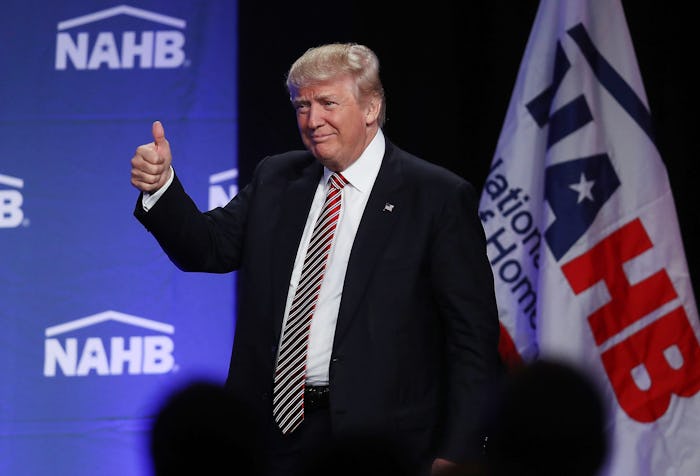News

Why Aren't Donald Trump's Lawyers Advising Him To Release His Tax Returns?
To put the essence of the the debacle that is election season 2016 into the mildest terms possible, Republican candidate Donald Trump has run an unconventional campaign. In between accusing President Barack Obama of founding the terrorist organization ISIS and ostensibly condoning an assassination attempt against his opponent, Democrat Hillary Clinton (although he claims it was all a "joke"), the real estate mogul has consistently refused to release his tax returns to the public. Presidential candidates' doing this is customary and expected in American politics, so why aren't Donald Trump's lawyers advising him to release his tax returns?
When presidential candidates share their tax returns with American voters — as they have done without exception since the 1970s, when Gerald Ford declined to do so — it offers the public a glimpse into how the candidates earn their money, whether and how they donate it, and what their tax rates are, according to CNN. Trump, however, simply won't do it, maintaining that that's because he's under what he has described as a "routine" IRS tax audit.
On Thursday, new broke that Clinton and her running mate, Tim Kaine, will unveil their latest returns, pressuring Trump follow suit. In response, Trump's special counsel told CNN's Wolf Blitzer that he believes that advising Trump to adhere to tradition during the audit would be "malpractice."
"I personally will not allow him to release those tax returns until the audits are over," Michael Cohen said on-air. "There is not a lawyer on this planet that should give that advice — any advice other than what I just gave — to their client short of suffering malpractice."
Trump, as the head of a lucrative real estate business, has claimed to be a billionaire, and the fact that he won't reveal his tax returns has prompted many to question that assertion. But he could have more insidious motivations for keeping them private, like allegedly attempting to conceal significant investments in Russia — a claim he's vehemently denied. There's ample evidence, though, that he is allegedly entangled financially with the anti-American nation, which, if true, amounts to an obvious conflict of interest for someone who's seeking our country's highest office. It's also possible that Trump allegedly may not have been paying income taxes at the rate he claims (if at all), or that his returns would show that his tax plans would benefit people in financial situations similar to his own.
In fact, even top IRS official Commissioner John Koskinen has publicly said that it would actually be no problem at all for the service if Trump were to release his returns during his audit — effectively negating Cohen's claims. Also, only Trump's tax returns dating back to 2009 are reportedly under audit; regardless, he won't show journalists any of that documentation at all.
At an Aug. 1 Clinton campaign rally, billionaire Warren Buffett offered Trump a proposition: Let's get together and both answer questions about our tax returns. "You're only afraid if you've got something to be afraid about," he said. "He's not afraid because of the IRS," Buffett told the crowd in Omaha. "He's afraid because of you."
Trump, predictably, didn't accept, or even acknowledge, the challenge. And he's under no legal obligation to. Although sharing tax returns is a tradition that goes unquestioned by modern presidential candidates, Trump has built his campaign around bucking convention. He's learned, too, that he can do this with very little political consequence. He seems to have evaluated the potential damage he could inflict on his presidential aspirations by taking ownership over his tax returns and explaining them to the American people versus simply pushing off the calls to share under the guise of the audit, and chosen what he perceives as the lesser of two evils.